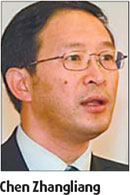A life of science and surprises
Updated: 2008-01-14 06:55
For many born in 1960s' China, their childhood dream was to have enough to eat.
Chen Zhangliang, born in 1961 in a remote and poor fishing village of coastal Fujian Province, was no exception.
But his life, as he frequently points out, has been full of luck and surprises.
 Chen, one of the country's pioneers in genetic engineering, got a new year surprise during the recent ministerial- and provincial-level personnel reshuffle - he was elevated from his position of president of China Agricultural University to vice-chairman of the Guangxi Zhuang Autonomous Region.
Chen, one of the country's pioneers in genetic engineering, got a new year surprise during the recent ministerial- and provincial-level personnel reshuffle - he was elevated from his position of president of China Agricultural University to vice-chairman of the Guangxi Zhuang Autonomous Region.
The move has surprised academic circles. As a friend who has known Chen for more than two decades, Huang Jikun, chief scientist at the China Agricultural Policy Research Center, believes the new position is "a big challenge" for Chen.
In an interview with China Daily, Huang described Chen as "frank, decisive, tireless and aggressive".
Regarded as outstanding returnee scholars, Huang and Chen have been long on advisory bodies assisting the premier and other senior leaders.
Chen's first fact-finding trip in his new position was to visit Guangxi's Baise, a poverty-stricken region where the late leader Deng Xiaoping launched a revolutionary uprising in 1929.
"The visit can refresh our pioneering sprit on the way ahead," said Chen, who feels grateful to Deng "from the bottom of my heart" as his opening-up policy allowed the scientists-turned-officials to study overseas.
Jing Yunchuan, director of Beijing-based Gaotong Law Service and a fellow alumni of Washington University, said: "Chen's move has again shown the leadership's regard for overseas returnees."
But news that "Brother Liang" (Liangge) was to leave China Agricultural University (CAU) left the campus feeling sad late last month. "Liangge" is an affectionate term of address students use for Chen, who has been president of CAU since 2002.
"Nobody wants Liangge to leave because he really cares about us. He'll remain our president forever, wherever he goes," said Li Lan, 19, a second-year English major.
Many students at CAU have Chen's name card and he frequently told them to "come to me if you have a problem".
The compassion and accessibility earned Chen great respect, perhaps unmatched by few university presidents. A 2005 survey by Chinablog.com found that around 80 percent of students didn't support, appreciate or even know who their university presidents were.
Chen has stood out for long. At the age of 19, he was the only one accepted to university from more than 100 high-school graduates in his home county of Fuqing.
When he graduated, he was picked to study transgenic plant engineering as a doctoral student at University of Washington. Chen, whose academic career focused on gene cloning and developing disease- and pest-resistant plants, completed his doctoral degree in biology in 1987.
Then State councilor Song Jian asked Chen to return to Beijing to set up the National Laboratory of Plant Genetic Engineering at Peking University.
He was promoted as associate professor at the age of 26 before becoming a full professor and working as deputy president of Peking University prior to becoming president of CAU in 2002.
Among his many honors are the UNESCO Javed Husain Prize for Young Scientists and Time's Global 100 Roster of Young Leaders for the New Millennium, as well as the Science and Technology prizes from the Ministry of Education.
He was also named as outstanding alumni by the University of Washington, which regards him as one of China's most prominent scientists.
Chen has published seven books and more than 150 research papers; and holds seven patents with an equal number pending approval.
21st Century contributed to the article
|
|
|
||
|
||
|
|
|
|